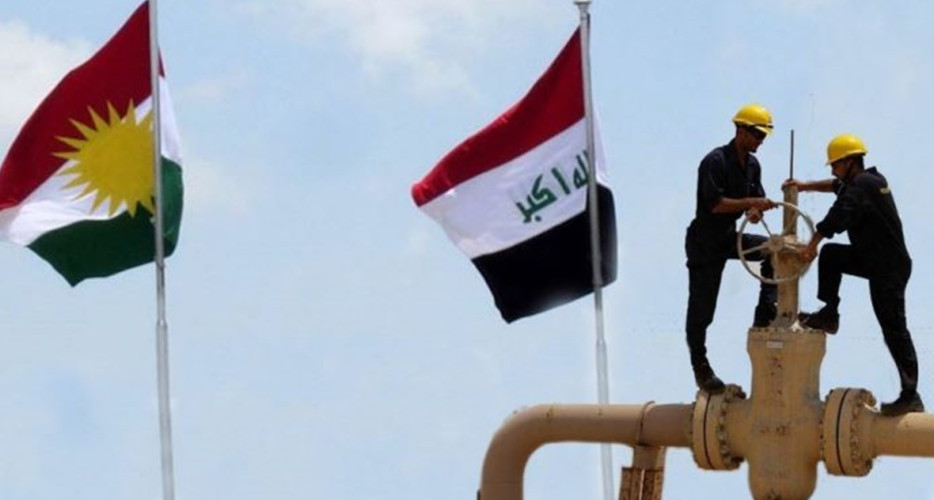
Peregraf
The Iraqi Council of Ministers, chaired by Prime Minister Mohammed Shia’ Al-Sudani, held its regular session today and approved two major decisions aimed at resolving longstanding issues over Kurdistan Region’s oil and financial dealings with foreign oil companies.
According to an informed source who spoke to Peregraf, the Cabinet decided that extraction fees for foreign oil companies, previously set at $16 per barrel, will no longer be paid in cash. Instead, companies will receive an equivalent amount of crude oil, which they will be responsible for selling in international markets.
In addition, the Cabinet gave preliminary approval for a tripartite agreement between the Kurdistan Regional Government (KRG), the Iraqi federal government, and foreign oil companies. Its implementation is conditional on submission to the Advisory Committee of the Iraqi Ministry of Oil, expected to provide a final response within 48 hours, after which the agreement can officially come into force.
KRG Confirms Tripartite Talks
The Kurdistan Regional Government (KRG) announced on Wednesday, September 10, that it is working with Iraq’s Oil Ministry and international oil companies to finalize a tripartite agreement that would allow the resumption of oil exports through the federal State Oil Marketing Organization (SOMO) and channel revenues into the federal treasury.
The statement followed a meeting of the KRG Council of Ministers, chaired by Prime Minister Masrour Barzani, where oil exports, non-oil revenues, pensions for Peshmerga forces, and citizens’ loan relief were discussed. Barzani confirmed that the KRG’s Ministry of Natural Resources has been instructed to intensify talks with oil companies to resolve outstanding contractual issues and remove obstacles to restarting exports. “The Council of Ministers emphasized the need to continue efforts with the federal government and oil companies to reach a tripartite agreement in the public interest,” he said.
SOMO Confirms Completion of Contracts
Today, the State Oil Marketing Organization (SOMO) announced the completion of all contracts and commitments with companies purchasing crude oil from the Kurdistan Region. SOMO emphasized that renewed exports from Kurdistan would reinforce Iraq’s position as a key supplier to Europe.
Ali Nazar Al-Shatri, SOMO’s Director General, told the Iraqi News Agency (INA) that “what occurred in the Kurdistan Region was a matter of understanding and establishing working mechanisms,” adding that “the law applies to everyone.” He stressed that both Baghdad and Erbil are now operating under a unified framework, noting, “The oil produced is Iraqi oil, with the distinction being only in the relationship between the KRG and the operating companies.”
Al-Shatri confirmed ongoing discussions between Baghdad, Erbil, and producing companies to finalize mechanisms under the 2025 budget law to resume crude exports to Turkey’s Ceyhan port. Currently, Kurdistan’s oil is used for domestic consumption, with exports set to resume once surplus volumes become available.
Under a recent agreement, the KRG must deliver at least 230,000 barrels per day to SOMO, receiving $16 per barrel in cash or derivatives. Current production stands at approximately 270,000 barrels daily, with 50,000 barrels reserved for domestic needs. Authorities in Erbil noted that recent drone attacks have limited full delivery but reaffirmed their commitment to supplying available volumes.
Progress on Federal-KRG Negotiations
Iraqi Foreign Minister and Deputy Prime Minister Fuad Hussein said negotiations between Baghdad and Erbil on oil and non-oil revenues are advancing. “There is rapprochement between the KRG and the federal government,” he told reporters, noting that joint committees are expected to finalize reports this week, paving the way for Cabinet approval and the release of long-delayed KRG salaries.
Oil exports from Kurdistan and Kirkuk have been halted since March 25, 2023, following an arbitration ruling in Iraq’s favor against independent Kurdish sales via Ceyhan, causing significant financial losses. Peregraf estimates these losses exceed $28 billion, with some reports suggesting combined losses for Baghdad and Erbil may surpass $50 billion.
A breakthrough agreement signed on August 11 allowed for resumption under new terms, allocating 50,000 barrels per day to KRG for domestic use and transferring the remainder to SOMO for export. Challenges remain, including restoring production after July’s drone strikes and meeting international companies’ demands for guarantees on arrears and cost recovery.
Meanwhile, public sector workers in the KRG are only now receiving June salaries in September, highlighting the urgency of finalizing revenue-sharing agreements to stabilize oil exports and the regional economy. The transfer of salaries by Baghdad is linked to unresolved issues over oil and non-oil revenues, with July and August payments still pending while half of September has already passed.
Salary disputes between Baghdad and Erbil have long been a source of political tension. While the federal government insists on tighter oversight of KRG revenues, Kurdish authorities argue that their share of the federal budget is constitutionally guaranteed. The issue also intersects with broader disagreements over energy exports, customs revenues, and regional autonomy.
The KRG employs around 1.2 million people, including civil servants, teachers, healthcare workers, and security forces. Salary delays have frequently triggered public anger and protests, particularly among low-income employees who rely heavily on timely payments.
In recent years, the federal government has periodically released funds to the KRG after negotiations, but recurring disputes over revenue sharing and control of oil exports continue to create financial uncertainty for public employees.